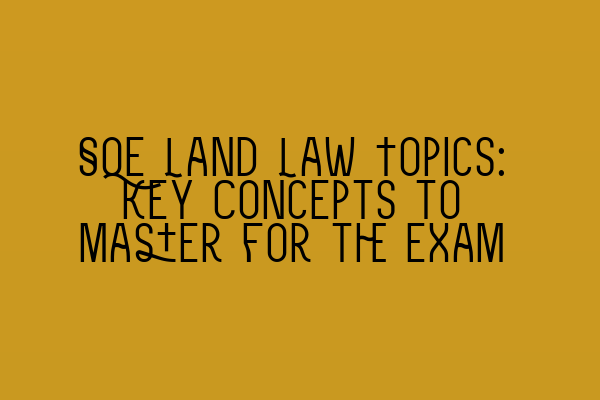SQE Land Law Topics: Key Concepts to Master for the Exam
As an aspiring solicitor, it is crucial to have a strong understanding of land law concepts in order to pass the SQE exam. SQE Property Law & Land Law is here to help you prepare for this challenging exam by providing you with a comprehensive overview of the key topics you need to master. In this article, we will cover some of the most important land law concepts that are commonly asked in the SQE exam.
1. Freehold and Leasehold:
Understanding the difference between freehold and leasehold is fundamental in land law. Freehold refers to absolute ownership of land, while leasehold refers to a temporary right to occupy the land. Make sure you are familiar with the rights and obligations that come with each type of ownership.
For further practice, check out these SQE 1 Practice Exam Questions to solidify your understanding of freehold and leasehold concepts.
2. Registered and Unregistered Land:
Land in England and Wales can either be registered or unregistered. Registered land has been officially recorded with the Land Registry, providing a higher level of certainty in terms of ownership. Unregistered land, on the other hand, requires further investigation to establish ownership. Familiarize yourself with the process of registration and the benefits it offers.
If you want to test your knowledge, attempt these SQE 1 Practice Mocks FLK1 FLK2 that include registered and unregistered land scenarios.
3. Easements and Covenants:
Easements and covenants are important legal rights and obligations that affect the use and enjoyment of land. An easement grants a non-possessory right over another person’s land, such as a right of way. Covenants, on the other hand, impose certain obligations on the owner of the land. It is essential to understand the elements, creation, and enforcement of easements and covenants.
4. Mortgages:
Mortgages play a significant role in property transactions. They are used to secure loans with the property itself acting as collateral. It is vital to understand the rights and obligations of both the mortgagee (lender) and mortgagor (borrower), as well as the process of foreclosure in case of default.
To further enhance your knowledge, consider enrolling in SQE 2 preparation courses, specifically tailored to help you excel in the mortgage-related topics of the SQE exam.
5. Co-ownership:
Co-ownership occurs when two or more individuals jointly own a property. Understanding the various forms of co-ownership, such as joint tenancy and tenancy in common, is crucial. Additionally, learn about the rights and obligations of co-owners and the implications of severance.
For comprehensive preparation, check out these SQE 1 preparation courses that cover co-ownership in detail.
6. Adverse Possession:
Adverse possession allows a person to claim ownership of land by occupying it for a certain period of time. It is important to understand the requirements for a successful claim of adverse possession and the potential defenses against such claims.
If you’re interested in staying up-to-date with the latest SRA SQE exam dates, visit SRA SQE Exam Dates for important information.
In conclusion, mastering key land law concepts is essential for success in the SQE exam. Utilize the resources provided in this article, including practice questions and preparation courses, to strengthen your understanding and improve your chances of passing. Good luck!
